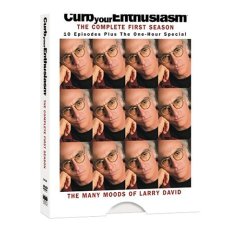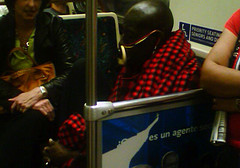Today’s Links for Media
“I’m a Little Scared of Elaine”
 One cool dream is to have an online presence so carefully honed that when a reference to an article like “I’m a Little Scared of Elaine: Representations of Jewish Women on Seinfeld and Curb Your Enthusiasm” appears the author of this article—or someone who knows the author—can just casually chime in with some wonderful details about this.
One cool dream is to have an online presence so carefully honed that when a reference to an article like “I’m a Little Scared of Elaine: Representations of Jewish Women on Seinfeld and Curb Your Enthusiasm” appears the author of this article—or someone who knows the author—can just casually chime in with some wonderful details about this.
My interest in the subject of the portrayal of Jewish women on Curb Your Enthusiasm came from a simple, racist, thought experiment: what’s happens when the Larry David character is clearly of African descent and he is married to a gentile? It became clear to me how it is possible that Larry David may not be a favorite among the Zionist community. He is playing a little too fast and loose with the old “self-hating Jew” thing. However, since my last visit to the Simon Wiesenthal Center (years ago), I saw how they took the presentation of the Jewish history with elegant reserve and refined solemnity while the little Black section there started off with a huge sign in broken English and that “tragic, comic hope” that Cornel West cherishes so much.
So Larry David’s “Jew jokes” are well within my comfort zone—even his “Black jokes” fit. But I can see someone from the elegant reserve and refined solemnity of the Wiesenthal aesthetic being a little scared of Elaine.
“Who’s that African guy with all that stuff in his nose?”
 Someone flickr.com, a yoga geek (?), took a photo of a guy that has been in the UCLA/Westwood area for decades. When I was in my twenties (a phrase I seem to write a lot), the mother of the mother of my third child tried to approach this man to open some kind of African liberation dialog. But she could not reach the brother.
Someone flickr.com, a yoga geek (?), took a photo of a guy that has been in the UCLA/Westwood area for decades. When I was in my twenties (a phrase I seem to write a lot), the mother of the mother of my third child tried to approach this man to open some kind of African liberation dialog. But she could not reach the brother.
Over a decade later, my experience suggests that this guy is through talking about African liberation because he has reached a conclusion—his form of African incarnation. Incarnation is different from a Civil War reenactment—you don’t take your “costume” off. You become “the character.” With the knowledge that it is rude and inappropriate for an African junior (like me) to speak in any manner resembling criticism about an elder that is clearly in an African context, here are my impressions of this man’s form of incarnation:
- First, I notice that he walks everywhere on bare feet. The ground in this city is too impure for me to be comfortable with that. The soil that our ancestors walked with years ago is far cleaner than the shit we have now—so modern steps should be taken to ‘blend and defend’ ourselves from these impurities. The twist on this is that my suggestion may be seen by my elder as an act of impurity. And, deeper still, my elder may have the voodoo power to walk on this filthy urban ground and not get injured. I am not being sarcastic about this, homes. No joke.
- Second, I notice that he is in Los Angeles in general and around the UCLA campus in particular. My assumption is that he would have some plan to return to continental Africa—perhaps to the land of the Maasai People to retire in comfort. The reason why I say Maasai is because of the red covering he uses that appears to come from this people—however his face adornments do not appear to me to be Maasai.
- Third, I cannot help but to assume that he was born in the United States. His presence just ‘feels’ that way in spite of all of that African equipment, covering.We have “met” only once in that we have walked together on the same sidewalk and he became aware of my presence. But first we have to get past all of the misunderstandings he has had with all of the so-called African people he has met in America before we actually meet—and this is why Black people really don’t meet each other because there are hundreds of years of misunderstandings to get through before we can really do the do. The voodoo gets around…
“Hyper-minorities & Academic Performance”
From maxambit.com: “Even though sociologists, social psychologists, and education scholars have studied these phenomena, still too little has been done by university policymakers to address the social and cultural challenges low-income and lower-middle-income minority students face in formidable university environments where they represent a very small percentage of the student population, such as elite universities, top graduate programs, and top professional schools. In these types of environments, talented minorities from low-income and lower-middle-income families become what I call hyper-minorities. They are not only minorities phenotypically, but they are also often socioeconomic, cultural, and linguistic (their native languages or English dialects are often different from those used in their new environments) minorities. Additionally, they are often disconnected from the social networks that helped them succeed socially and academically before they became hyper-minorities.”
I wrote a sub-novel called Audiomilkcrate during my undergraduate years in college just to document many of the issues opened up by this maximbit.com discussion. One of the greatest youth errors I made in my life was to assume that getting a fine, world-class European education without becoming assimilated unto European consciousness is easy. Now that I survey the ruins, it is clear to me that my mother and father made it ‘easy’ for me. Too many self-described “white people” can’t stand to spend a few minutes on an elevator when it is clear they are the “racial” minority—now do try to imagine what it is like to be this minority for five years under the highest intellectual stress knowing you are “the other.” I used to look down on my fellow students “of color” who appeared to me were fooling themselves into thinking they were a part of the majority. Unfortunately for them, now I know that most of them were not fooling.
